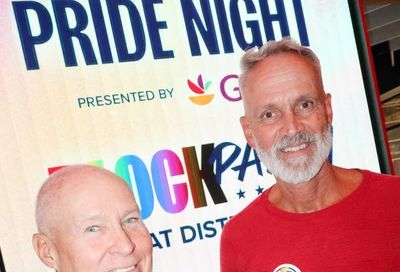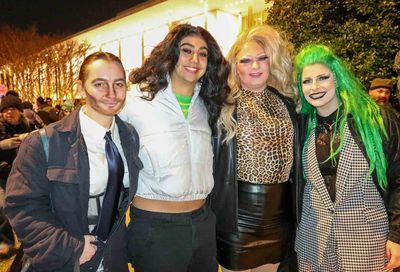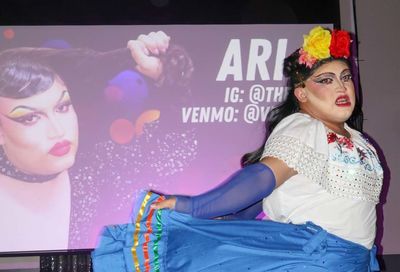Republicans back Cuccinelli for Virginia governor
Poll shows former attorney general and 2013 candidate for governor is favorite for party's nomination in 2017

If Republican primary voters in Virginia had their way, the Old Dominion could be seeing a repeat of Ken Cuccinelli’s run for governor. And according to a new poll, he could actually win this time.
Cuccinelli, the 2013 Republican gubernatorial candidate and former attorney general who cut his profile as a socially conservative firebrand during his time in public office, now serves as president of the Senate Conservatives Fund political action committee. He has not indicated whether he plans on mounting a future campaign for political office, but a poll from Public Policy Polling (PPP) reveals that he would have the edge in the GOP primary, and would either be tied or lead in the general election for governor.
The poll, which was released on Friday, questioned 1,170 registered voters, including 502 self-identified Republicans and 409 self-identified Democrats, from July 13-15. It shows Cuccinelli leading the Republican field for the 2017 gubernatorial nomination. Thirty-seven percent say they want Cuccinelli as their nominee, with sixteen percent picking former House Majority Leader Eric Cantor. Eight percent pick former Lt. Gov. Bill Bolling, while another eight percent pick former Republican Party chairman and 2014 Senate nominee Ed Gillespie. Seven percent choose 2013 attorney general candidate and State Sen. Mark Obenshain (R-Harrisonburg) and 1 percent select 2013 lieutenant governor candidate Pete Snyder, a businessman and FOX News personality. However, a quarter of potential GOP voters say they are undecided.
While PPP’s poll showed Cuccinelli as the best known and most popular candidate, it is actually Gillespie who does the best in a general election matchup against potential Democratic candidates. But Cuccinelli outperforms other candidates among the 40 percent of potential Republican voters who describe themselves as “very conservative,” with 67 percent viewing him favorably. In contrast, only 40 percent of those “very conservative” voters think of Gillespie favorably.
Because incumbent Governor Terry McAuliffe (D) is prohibited from running for a second term, PPP polled a hypothetical Democratic primary among the state’s other two Democratic statewide officeholders, Lt. Gov. Ralph Northam and Attorney General Mark Herring. Herring gets the support of 33 percent of Democratic primary voters, while Northam gets 9 percent. But a whopping 58 percent of Democrats are undecided, meaning the race is much more fluid. Both Herring and Northam are relatively unknown, with fewer than half of self-described Democrats knowing who Herring is and a little more than a third of Democrats knowing who Northam is. Among very liberal voters, Herring has a 47-15 favorability spread, while Northam’s is 27-22.
In a general election matchup, Cuccinelli, the presumptive GOP favorite, ties Herring with 38 percent of the vote, and leads Northam, 35 percent to 33 percent. Herring also ties Obenshain and leads Cantor, but trails Gillespie, while Northam trails all GOP candidates, though by small margins. Those findings are generally consistent with the tight margins of most recent general elections for statewide office, reflecting Virginia’s status as a swing state.
In its writeup of the poll results, PPP’s Tom Jensen wrote, “How predictive is any of this? In the summer of 2011 we found Cuccinelli leading McAuliffe by 3 points. Two years later, McAuliffe ended up beating Cuccinelli by 3 points. So really all you can take from it for now is that it’s close.”
Kyle Kondik, communications director for the University of Virginia’s Center for American Politics and managing editor of the Center’s political newsletter Sabato’s Crystal Ball, says he believes the PPP poll is basically picking up the candidates’ degree of name recognition, noting that it is just a snapshot and still very early. He also said that the field may include different candidates or may omit some others included in the poll.
“The one thing about Virginia’s unique one-term limit is that there’s always a lot of interest in the race, because there’s never an incumbent,” Kondik says. “It’s one of the things that leads to perpetual jockeying and interest in the contest.”
Kondik points out that the poll shows Cuccinelli’s edge in the primary comes from very conservative voters, due in part to the image Cuccinelli cultivated over his years in the General Assembly and as attorney general as a cultural conservative.
“He’s just better known than these other candidates,” Kondik says of Cuccinelli, while also noting that Cuccinelli had several weaknesses as a candidate when he last ran for governor.
Based on what he’s heard on the ground, Kondik believes Obenshain actually has a good chance of being the GOP’s nominee. While Obenshain has views similar to Cuccinelli, he has been decidedly less upfront and less vocal in touting them during his time as state senator and during his failed campaign for attorney general.
“It’s kind of sounding like Mark Obenshain, who came so close to winning the attorney general’s race in 2013, and has a legendary name in Virginia Republican politics, is often mentioned as the frontrunner for the nomination,” Kondik says. “I think Obenshain is a guy who’s well-liked in the party, he’s someone that the different wings could get behind.
“Ed Gillespie’s name is sometimes mentioned,” Kondik continues. “One interesting thing is a lot of Obenshain’s 2013 campaign staff worked for Gillespie in 2014. I’ve always heard there’s been this understanding that Obenshain would get a crack at the governor’s race. But who knows, really? Gillespie could run and be a formidable candidate for the nomination. I think Obenshain would be a formidable candidate as well.”
As for Democrats, Kondik just says it’s too early to tell who ends up with the nomination.
“I think Herring is in a position where he can throw more red meat to his base because of his attorney general position, so I think he’s just going to generate more news,” he says. “And I think he’s done more things to cultivate the left. But otherwise, I wouldn’t make any broader generalizations about that.”
Support Metro Weekly’s Journalism
These are challenging times for news organizations. And yet it’s crucial we stay active and provide vital resources and information to both our local readers and the world. So won’t you please take a moment and consider supporting Metro Weekly with a membership? For as little as $5 a month, you can help ensure Metro Weekly magazine and MetroWeekly.com remain free, viable resources as we provide the best, most diverse, culturally-resonant LGBTQ coverage in both the D.C. region and around the world. Memberships come with exclusive perks and discounts, your own personal digital delivery of each week’s magazine (and an archive), access to our Member's Lounge when it launches this fall, and exclusive members-only items like Metro Weekly Membership Mugs and Tote Bags! Check out all our membership levels here and please join us today!
























You must be logged in to post a comment.